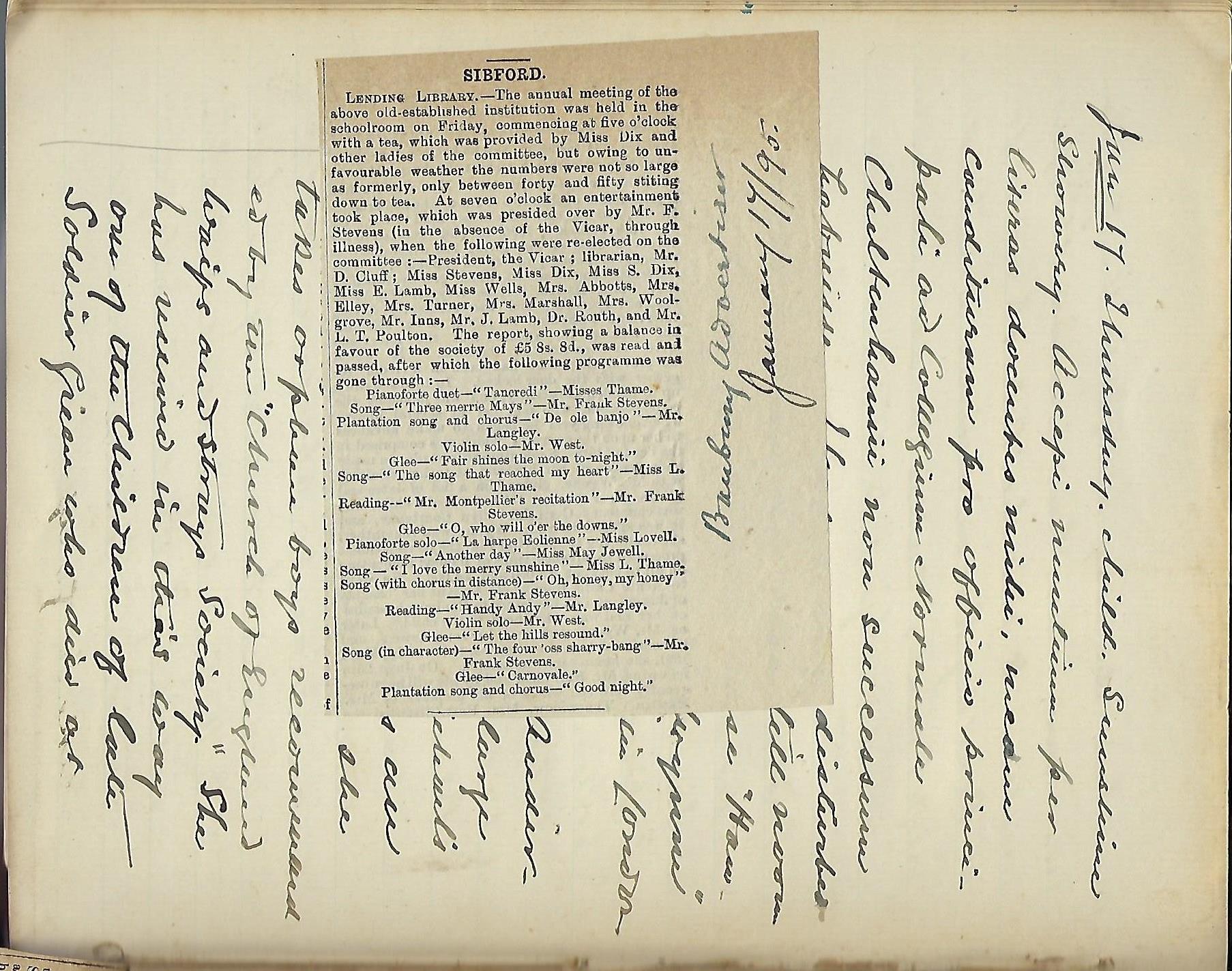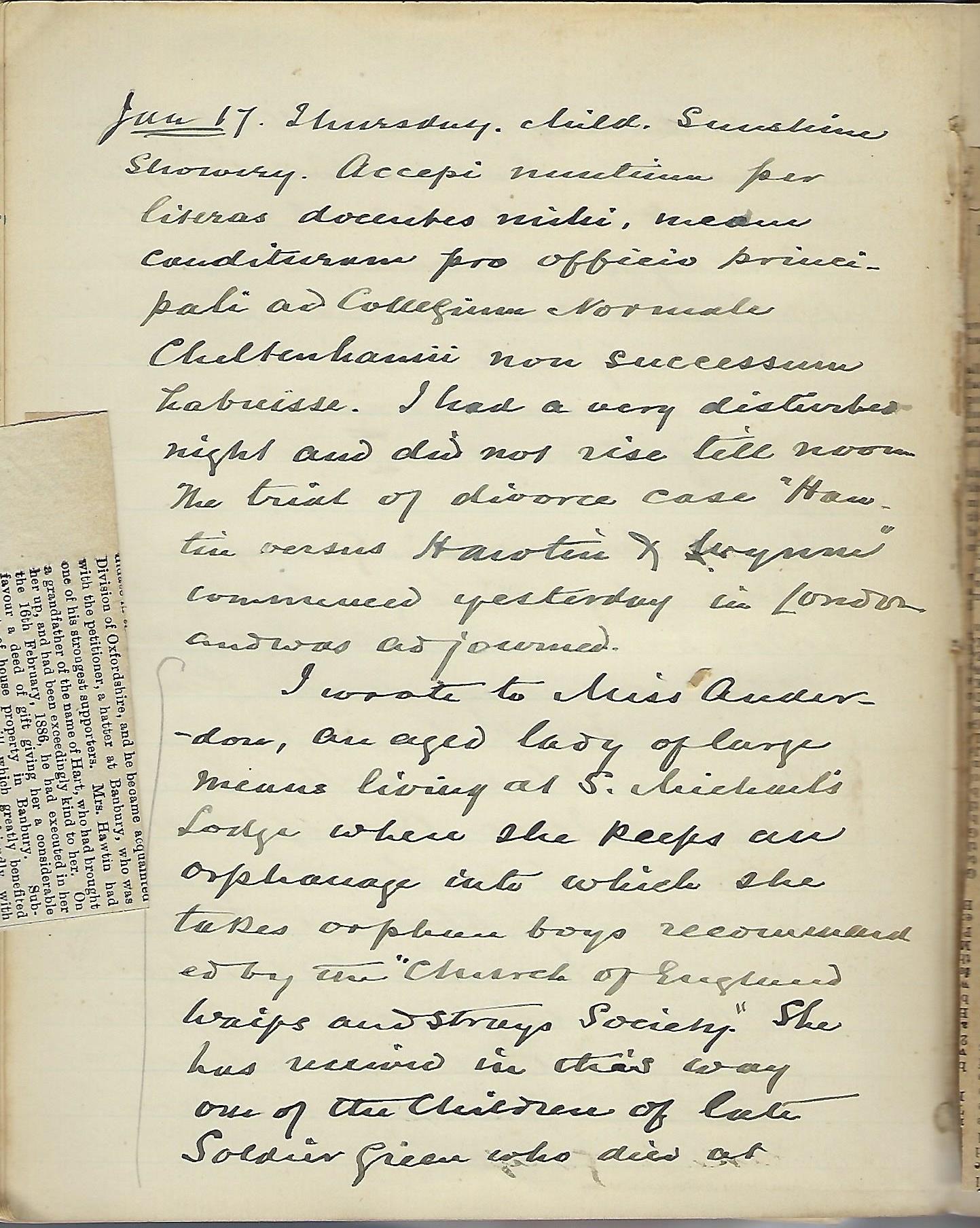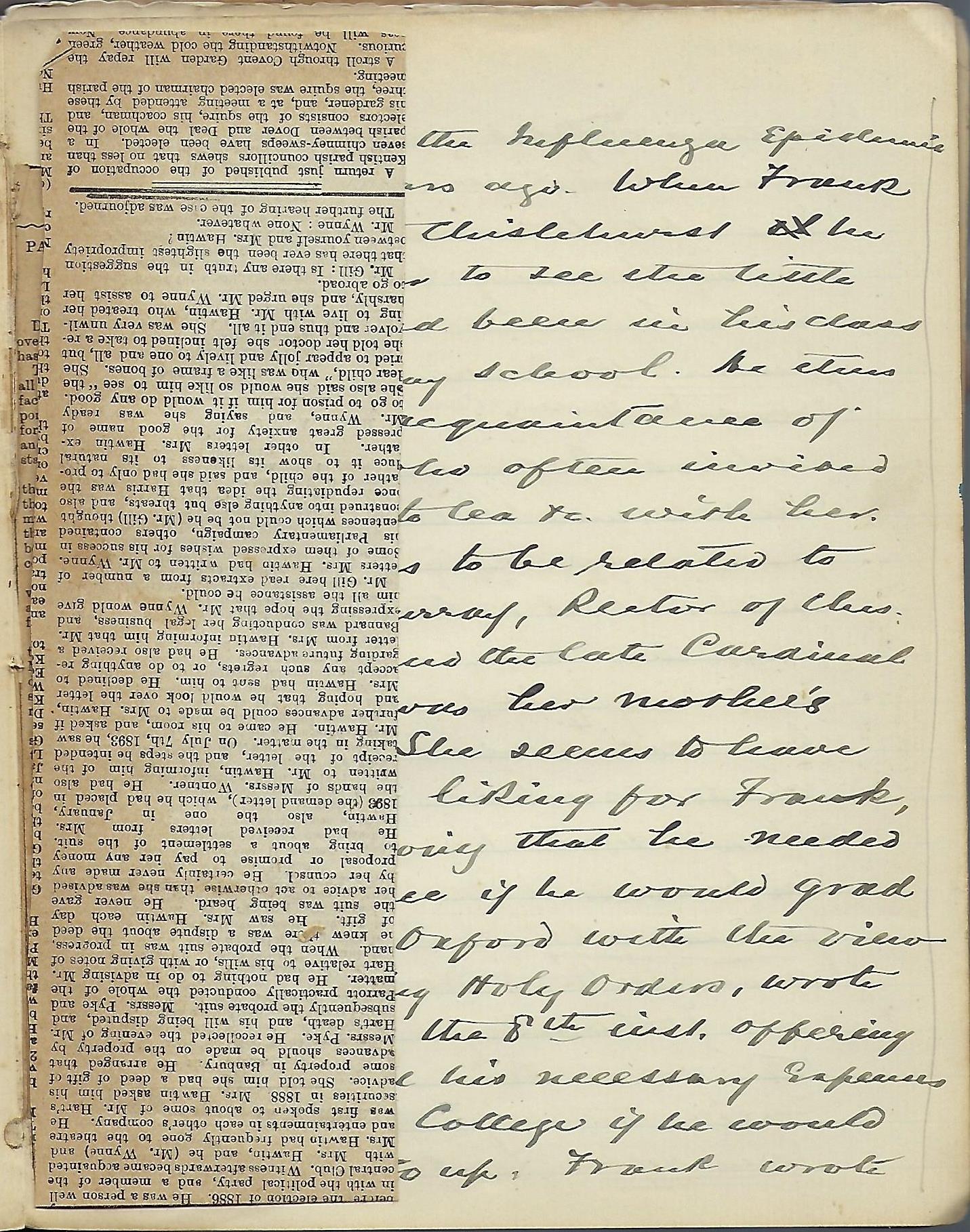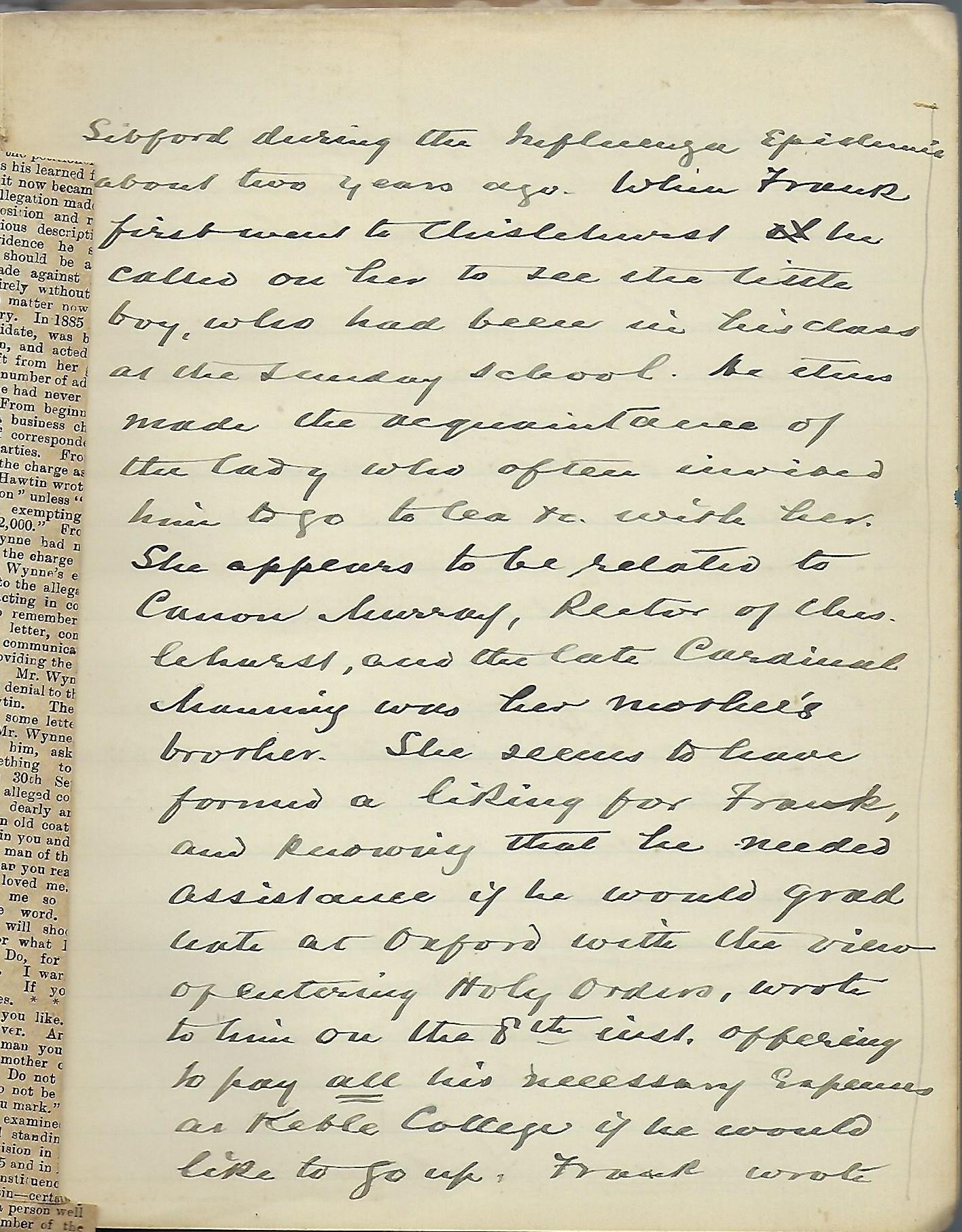1895, January 17, Thursday a b c d e
Mild. Sunshine. Showery.
Accepi nuntium per literas docentes mihi, meam candituram pro officio principali ad Collegium Normale Cheltenhamii non successum habuisse.
I received news by letter informing me that my application for the office of Principal at Cheltenham Normal College had not been successful. See 27 December 1894
I had a very disturbed night and did not rise till noon. The trial of divorce case “Hawtin versus Hawtin and Wynne” commenced yesterday in London and was adjourned.
I wrote to Miss Anderdon, an aged lady of large means living at St Michael’s Lodge, where she keeps an orphanage into which she takes orphan boys recommended by the “Church of England Waifs and Strays Society”. She has received in that way one of the children of late Soldier Green who died at Sibford during the influenza epidemic about two years ago. When Frank first went to Chislehurst he called on her to see the little boy, who had been in his class at Sunday School. He thus made the acquaintance of the lady who often invited him to go to tea etc with her. She appears to be related to Canon Murray, Rector of Chislehurst, and the late Cardinal Manning was her mother’s brother. She seems to have formed a liking for Frank, and knowing that he needed assistance if he would graduate at Oxford with the view of entering Holy Orders, wrote to him on the 8th inst. offering to pay all his necessary expenses at Keble College if he would like to go up. Frank wrote by return of post gratefully accepting her kind offer. I have not been able to write to her until today, having been in bed so much.
Cutting from the Banbury Advertiser, 17 January 1895
PARISH MEETINGS VERSUS PARISH COUNCILS.
MR. LEAKE’S LETTER re DEMAND OF POLL.
TO THE EDITOR.
Dear Sir,—Mr. Leake’s discretion has it last overcome his valour, and at the eleventh hour he has withdrawn his demand for a poll.
The Chairman of the Parish Meeting had made all the necessary arrangements for an election, in face of being so unfairly attacked by your correspondent in your last issue. Although the demand for a poll is withdrawn, the gross mis-statement an charges made by Mr. Leake ought to be substantiated by him, or otherwise an apology given.
Mr. Leake says it was stated at the meeting (but that it was untrue) that a Parish Meeting had all the powers of a Parish Council. No one at the meeting said it had, unless application was made to the County Council for those powers, which could be granted by them under the Act as easily as they could grant a Parish Council.
Reference is made to certain officers ruling the village. Mr. Leake must not be allowed to do so, as his views are so changeable. One time he is in favour of a Parish Meeting, another time a Council.
Your correspondent draws a very wide distinction between the results to be obtained by a Parish Meeting and by a Parish Council. I think he has drawn on his own imagination rather too much ; still, I should be extremely glad to see his hopes realised.
Mr. Leake’s action and calling attention to, as he says, the doubtful actions of those responsible for the calling of the meeting is very reprehensible. He knows perfectly well that the meeting was opened at the time appointed (in the Gymnasium as arranged at the Parish meeting), that the notice convening the meeting was read over, and that by the kindness of Mr. R. B. Oddie an adjournment was made to the dining room, a few yards distant and in full sight, which was very warm, and much more comfortable than in the cold gymnasium. It is the height of absurdity to object to such a sensible arrangement.
Mr. Leake makes so many grave charges of intimidation that are unfounded that, with your kind permission I submit to him the following questions :
What section of the Act states the precise time that application must be made for a Council, and also where it is stated that if not applied for at once the parish will be debarred forever from having one.
Were you not in favour of the ballot, and did you not express yourself as such ?
What was the inducement held out to employers and property-holders to attend the meeting ?
What was the hindrance, and by whom placed, in the way of the labourers attending ?
How many electors went away thinking the meeting was postponed ?
Let me, Mr. Editor, in conclusion, congratulate Mr. Leake on the happy feelings he must experience through his being such a faithful defender of the weak and the poor as he represents himself to be.
Apologising for trespassing on your space, and thanking you in anticipation,
I beg to remain,
Yours very truly,
AN ELECTOR.
TO THE EDITOR.
Dear Sir,—As there appears to be some misunderstanding respecting the course of events at Sibford Ferris, which culminated in a demand for a poll on the 28th ult., I may perhaps be allowed briefly to state the facts.
On October 22nd, an informal meeting of parishioners was held to consider whether it would be best to amalgamate with an adjoining parish in carrying out the Local Government Act or to remain independent. A large majority were in favour of the latter course, the opinion of the meeting at that time not being specially taken as to the establishment of a Parish Council.
At the Parish Meeting on December 4th, a resolution was passed calling upon the chairman to convene a meeting for the express purpose of considering the subject of a Parish Council. In accordance therewith, the Chairman issued a fourteen days’ notice of a meeting to be held in the Gymnasium of the Friends’ School, on the 28th December. The meeting met, and was opened in the room advertised, and then an adjournment was made to a more comfortable room on the premises, which was at liberty owing to the absence of the school family ; the Chairman placing a notice at the entrance to the gymnasium informing all late comers of the change. One voter appears to have failed to see the notice, and missed attending the meeting.
I will not here dwell upon what took place at the meeting, as it was fully reported in your last issue ; suffice it to say that although it was for the present decided to remain a Parish Meeting, there is still the right at any time to make application for a Council if thought best.
There is in this village an excellent understanding between employer and employed, and we desire that all classes may take an interest in any matter that may claim our attention ; and by their attendants, advice, and votes may endeavour to promote the future well-being of our parish.
I am, yours, &c.,
JOSHUA LAMB.
TO THE EDITOR.
Sir,—Of the six paragraphs comprising the extraordinary letter appearing in your last issue, not one will bear the test of even a superficial examination. The writer of that letter is evidently now of the same opinion himself, as he has withdrawn his demand for a poll, about which he was so excitedly anxious a week ago. All this is very characteristic of one who in emergencies is of a very retiring disposition. He is a firm and practical—and practised—believer in the adage :—
He that fights and runs away
May live to fight another day.
But somehow the “other day” never comes to this Doughty champion of “the cause of the weak and poor against the arrogant assumption of wealth and power.”
Your sincerely,
S. FERRIS.
[The foregoing letters were received late last week.]





